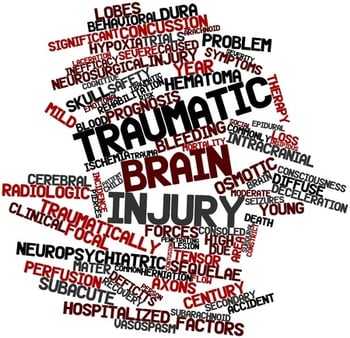WHAT: An overview of information on Traumatic Brain Injuries. TBI is a complex injury and includes a large spectrum of symptoms and disabilities. TBIs can be present from initial onset or delayed. Even a mild TBI, such as a concussion, can become a significant problem if not diagnosed. Multiple undiagnosed, untreated, mild TBI concussions can lead to a moderate to severe TBI over time. TBI presents itself in a variety of ways and generally leads to secondary diagnoses. Those secondary diagnoses are dependent on the area of the brain that the injury occurred in.
 Specific symptoms are caused by injuries to distinct areas of the brain. Injury to the frontal lobes will cause loss of higher cognitive functions and can result in secondary diagnoses such as aphasia (inability to speak or recall words) and loss of inhibitions leading to inappropriate social behavior. Injury to the cerebellum can lead to loss of coordination and balance. A brainstem injury can affect the autonomic nervous system’s ability to control things like breathing and heartrate.
Specific symptoms are caused by injuries to distinct areas of the brain. Injury to the frontal lobes will cause loss of higher cognitive functions and can result in secondary diagnoses such as aphasia (inability to speak or recall words) and loss of inhibitions leading to inappropriate social behavior. Injury to the cerebellum can lead to loss of coordination and balance. A brainstem injury can affect the autonomic nervous system’s ability to control things like breathing and heartrate.
HOW: TBIs can happen to anyone, there are no genetic risk factors. They most commonly occur in car accidents, falls and sports injuries. TBIs must be diagnosed by a medical professional, who can utilize a variety of scales (Glasgow, Ranchos Los Amigos, etc.) to determine the severity of the injury. The medical professional will categorize a TBI in three different ways: mild, moderate or severe.
In a practical sense, how do we know when to go to the doctor and when not to? It’s not an easy distinction to make. Here are some things to look for in someone who has experienced a head injury: confusion, changes in any of the five senses (speech/taste, hearing, physical pain, smell, vision) memory loss, obsessive compulsive tendencies, distraction, aggression, depression, etc. As a general rule, head injuries should always be taken seriously and followed up by with a medical professional, the sooner the better.
There is no cure for a Traumatic Brain Injury but there are treatments specific to the symptoms which can enable a TBI patient to live a more normal life. Those include the initial treatment after the injury, rehabilitation, acute and surgical treatments. The best treatment or therapy for a TBI is making sure it does not happen in the first place.
PREVENTION: Preventative measures can easily be taken to counteract potentially poor outcomes. Protective equipment such as seat belts when in a vehicle, railings on stairs and helmets during potentially intense physical activity, can be the difference between life as we know it and a life we’d never planned for.
IMPACT: TBIs can greatly impact one’s sense of self, bodily and mentally. Drastic personality changes can occur in someone suffering from a TBI. Our core personality traits and identity can be permanently altered. The overall experience of these changes is often very hard on both the directly affected individuals and their families. Understanding why these changes have occurred is the first step in recovering from the negative emotional impact that TBIs present.
Disclaimer: the information contained in this blog is meant to be for informational purposes only. It is not meant to substitute for advice provided by your own physician or other health care provider.